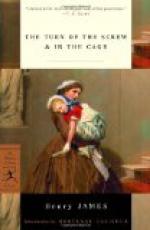CHAPTER X
“They’re the most awful wretches, I assure you—the lot all about there.”
“Then why do you want to stay among them?”
“My dear man, just because they are. It makes me hate them so.”
“Hate them? I thought you liked them.”
“Don’t be stupid. What I ‘like’ is just to loathe them. You wouldn’t believe what passes before my eyes.”
“Then why have you never told me? You didn’t mention anything before I left.”
“Oh I hadn’t got round to it then. It’s the sort of thing you don’t believe at first; you have to look round you a bit and then you understand. You work into it more and more. Besides,” the girl went on, “this is the time of the year when the worst lot come up. They’re simply packed together in those smart streets. Talk of the numbers of the poor! What I can vouch for is the numbers of the rich! There are new ones every day, and they seem to get richer and richer. Oh, they do come up!” she cried, imitating for her private recreation—she was sure it wouldn’t reach Mr. Mudge—the low intonation of the counter-clerk.
“And where do they come from?” her companion candidly enquired.
She had to think a moment; then she found something. “From the ’spring meetings.’ They bet tremendously.”
“Well, they bet enough at Chalk Farm, if that’s all.”
“It isn’t all. It isn’t a millionth part!” she replied with some sharpness. “It’s immense fun”—she had to tantalise him. Then as she had heard Mrs. Jordan say, and as the ladies at Cocker’s even sometimes wired, “It’s quite too dreadful!” She could fully feel how it was Mr. Mudge’s propriety, which was extreme—he had a horror of coarseness and attended a Wesleyan chapel—that prevented his asking for details. But she gave him some of the more innocuous in spite of himself, especially putting before him how, at Simpkin’s and Ladle’s, they all made the money fly. That was indeed what he liked to hear: the connexion was not direct, but one was somehow more in the right place where the money was flying than where it was simply and meagrely nesting. The air felt that stir, he had to acknowledge, much less at Chalk Farm than in the district in which his beloved so oddly enjoyed her footing. She gave him, she could see, a restless sense that these might be familiarities not to be sacrificed; germs, possibilities, faint foreshowings—heaven knew what—of the initiation it would prove profitable to have arrived at when in the fulness of time he should have his own shop in some such paradise. What really touched him—that was discernible—was that she could feed him with so much mere vividness of reminder, keep before him, as by the play of a fan, the very wind of the swift bank-notes and the charm of the existence of a class that Providence had raised up to be the blessing of grocers.




